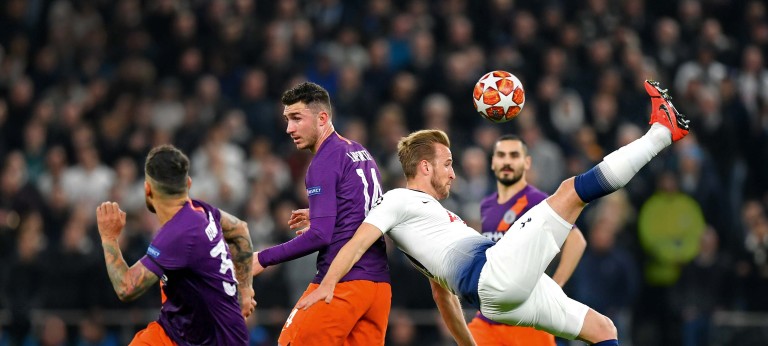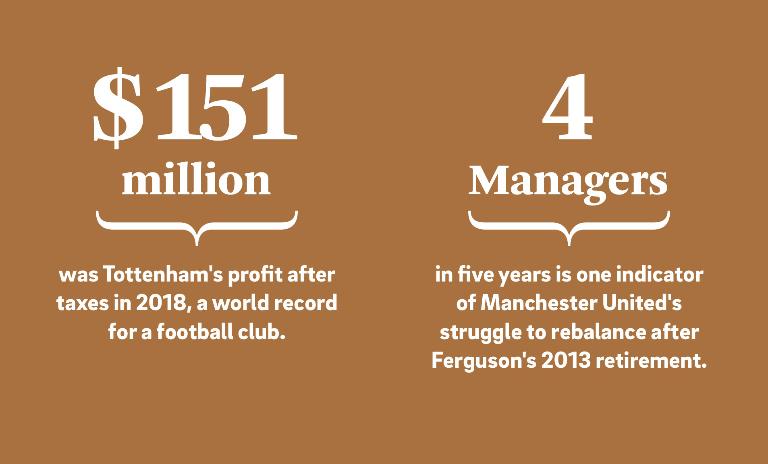Your path to tomorrow, today
![{[downloads[language].preview]}](https://www.rolandberger.com/publications/publication_image/tam_future_cover_en_download_preview.jpg)
The actions of the present lay the foundations for the future. What does this saying mean in turbulent times? Consider a mix of solidity and flexibility!


Even the best football clubs can struggle in balancing uncertainty with a long-term vision, but other businesses have plenty to learn from their losses and wins – from quick reaction times to building the right team, the key to success is in setting up your next goal, all while keeping on scoring today.
When José Mourinho was sacked in December 2018, Manchester United's criticism of the formerly lauded Portuguese manager was damning. Despite winning two trophies in his first season, the club said he had failed to improve results after spending nearly $525 million on players and had ignored the club's philosophy of playing attacking football while developing young players. The club, built on solid foundations after Sir Alex Ferguson's 26 years in charge, was left looking for a fourth manager in five years since he retired in 2013. How could one of the richest football clubs in the world get it so wrong? The answer underlines how football clubs often struggle with the balance of short-term results and long-term vision – perhaps understandable when fans are demanding instant success and the financial rewards have never been greater. As Football Association Technical Director Les Reed says: "In football you report to your stakeholders every week when 30,000 fans come to judge you."
It also shows how getting the right structure in place can ensure a better equilibrium and how business can learn a lot from football. "Long-term planning is what everybody wants to do in football, but it can be nigh on impossible," says Mike Rigg, technical director at Premier League team Burnley and former head of player acquisition at Manchester City. He says that results can change everything despite football's simple business model, where income via television deals, commercial revenue and ticket sales is balanced by player salaries and business development. "When I was at Manchester City, we missed out on reaching the Champions League in the penultimate game of the 2009-10 season because we lost to Tottenham. As a result, 50% of our player targets were wiped off the table. So there goes your long-term planning." Professor of Sports Enterprise at Salford Business School Simon Chadwick says that unlike other industries, "uncertainty is football’s core product." He adds: "Amazon, HSBC and BMW don't face the prospect of getting promoted or relegated each year ... That leads to a short-term culture because next season if you get relegated it will be disastrous. But over the last 10 years and arguably since the formation of the Premier League in 1992, the sport has been through a cultural transition where strategy and medium- to long-term thinking are considered as important as tactics and short-term thinking."
The pitfalls of falling into a short-term culture were nowhere more apparent than at Manchester United post-Ferguson. The club tried to continue his legacy with Everton manager David Moyes, who proved to be too inexperienced, former Barcelona and Netherlands boss Louis van Gaal, who added authority but did not fit the club's philosophy, and Mourinho, who ended up being a quick fix. What the club lacked was the long-term vision that the Scotsman Ferguson supplied. Reed, appointed at the FA in December, is among those who think Ferguson evolved to be more like a director of football rather than a manager during his later years at the club. Directors of football or technical directors are "crucial," says Reed, because they offer a link between the boardroom and the pitch, much in the way a North American sports team might have a vice president for sport and a vice president for business. This allows them to take overall responsibility for football operations and they can cover recruitment, contract negotiation, player and team development, plus being responsible for the head coach or manager. In Ferguson's case, this allowed him to focus on the big picture while his coaches took more control of the day-to-day operations. Reed adds: "Somebody has to have the ability to manage everything that comes under the football part of the business because that’s where the investment is going. It requires having enough understanding of the finances, but also what might be required from a technical point of view to build a team and a club capable of sustaining success."
Swedish club Östersunds has competed with some of Europe's top teams despite being on a fraction of their budget. David Webb, a technical director with the club, previously worked with Reed while at Southampton. He has also been involved at UK Premier League clubs Tottenham Hotspur and Bournemouth. "European clubs have had technical directors for a long time now and it probably wasn't accepted in England for a number of years," he says. "If you remain in the Premier League, it can be financially rewarding, but in the race to get there, it can lead to a high turnover of managers and players, which means you are going to suffer financially. "If you have a long-term vision and someone in a technical director role, the identity of the club can stay the same and you can build something more sustainable."
There has never been more money in England's Premier League: The top 20 teams are set to receive $6 billion over the next three seasons. But chasing that money can lead to ruin. Webb cites Aston Villa as a team that tried to spend its way back to the Premier League since being relegated in 2016, with pre-tax losses of $48.2 million last season. Norwich City, who were relegated the same season, have used a longer-term approach and investment in younger players to help them climb towards the Premier League. He also credits Tottenham, who posted a world-record profit of $151 million after tax last season. Webb says part of that is down to manager Mauricio Pochettino, who develops talent within the club rather than spending huge sums on recruiting new players. Captain Harry Kane is an obvious example, and he is now valued at about $226.8 million. Chadwick says clubs need the "strategic discipline" which other businesses apply. "Whether it's a high-end company like Gucci or Chanel or another that sells discount toys, you need to create products, position them in the market, give them an identity, charge an appropriate price and engage with a value-adding key target audience." Former Manchester City CEO Garry Cook goes further, saying clubs can build sustainable success by focusing on what the club means to people: "The truth is that your brand is so much more important today ... Over the last 100 years, you've developed that brand, and it would have evoked thought and commentary, so for long-term sustainability, you need to invest in it."
Football clubs are still rising to the long-term thinking challenge, but Chadwick thinks business can learn from how football manages in the short term. "There is something that football could tell other industries about managing uncertainty, how they respond to fluctuations in performance and challenging operating conditions, how to establish winning cultures and re-establishing performance levels after a big loss." He goes on to argue that every aspect of an elite footballer's performance is analyzed and that the expectation is to deliver consistently strong service. "In business, that level of performance is something which many companies aspire to but never achieve," he concludes. Reed adds to the argument by citing the context for assessment. Playing in front of fans each and every week means that you have to assess what you're doing, adapt it and apply solutions quickly. "The classic example, " he says, "is the personal development review when your line manager sits down with employees and discusses the whole year. Really? You're going to wait a whole year to assess what might be going wrong? There are a lot of protocols in business which are based on annual reviews or accounts but in football there is a continuous assessment."
Playing in front of fans each and every week means that you have to assess what you're doing, adapt it and apply solutions quickly.
There are many clubs which successfully combine both short- and long-term goals, but even then, they still need to provide what every fan craves: cups and trophies, which are in limited supply. In addition to their record profits, Tottenham have reached the Champions League final for the first time in their third successive season in the competition. They have, though, suffered the taunts of rival supporters for failing to win trophies.
At Manchester United, the struggle to find the right balance between the two is ongoing. Former striker Ole Gunnar Solskjaer is their new manager and, initially, he brought the good times back to Old Trafford with a swashbuckling style and a reliance on youth previously seen under Ferguson. But poor results since then have led to further questions about the club's direction. The Norwegian is seen as the right man to ensure the club's DNA remains, but for a relative novice in the Premier League, several observers believe that Manchester United must appoint a director of football as soon as possible to help him succeed and to ensure that the club's long- and short-term vision never become so disjointed again.

![{[downloads[language].preview]}](https://www.rolandberger.com/publications/publication_image/tam_future_cover_en_download_preview.jpg)
The actions of the present lay the foundations for the future. What does this saying mean in turbulent times? Consider a mix of solidity and flexibility!
Curious about the contents of our newest Think:Act magazine? Receive your very own copy by signing up now! Subscribe here to receive our Think:Act magazine and the latest news from Roland Berger.

